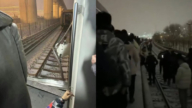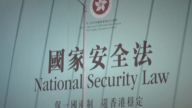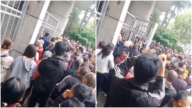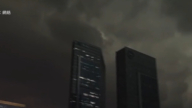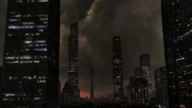【新唐人2013年04月13日讯】荣获第85届“奥斯卡金像奖”最佳原创剧本大奖,及最佳影片、最佳摄影和最佳音效剪辑提名的影片《被解救的姜戈》在中国电影院放映一分钟之后,突然被叫停。影院向观众解释,接到广电总局和中影集团通知,因技术原因停放。大陆观众无不感到惊愕并批评做法荒唐。
美国好莱坞鬼才导演昆丁塔伦蒂诺(Quentin Tarantino)最新执导的影片《被解救的姜戈》于4月11号在中国上映当天,被紧急叫停。
有网民在微博上反映,电影播放了一分钟左右停止播放,工作人员进场说﹕广电总局来电话说要推迟放映。
据美国《华尔街日报》报导,影院工作人员当场道歉并退款,观众起初感到震惊,后来忍不住为这荒谬而全埸大笑。
“英国广播公司”《BBC》 引述发行商的话说,他们事前已把电影中的血液颜色调暗,并且调整“血溅”的高度,以配合中共当局的审查。
《被解救的姜戈》影片故事,设定在美国内战前两年的美国南部,姜戈是一名获得了自由的黑人奴隶,在一名德国裔的赏金猎人的指导下,成为一名赏金猎人。他协助德国赏金猎人缉拿各种通缉犯以换取报酬,并试图从邪恶的大农场主人手中解救出自己的妻子。
据大陆《新民晚报》报导,院线人士透露,目前还没有消息表明《被解救的姜戈》会在短时间内重新上映,影片可能就此和中国的大银幕绝缘。目前有业内人士反馈最新消息说,影片有未被剪掉的男主角暴露镜头,才被临时撤档,网友则批判中国的审查制度。
也有部分网友质疑,影片中反抗奴隶主人的内容,刺激了审查部门“敏感的神经”。还有人认为,影片中倒挂鞭打黑人奴隶的镜头,让人联想到最近大陆媒体报导的“马三家劳教所”的酷刑虐待。
大陆文艺评论家叶匡正曾看过这部影片。他说,这部片子跟大陆演员姜文的《让子弹飞》有相似之处。
大陆文艺评论家叶匡正:“我觉得其实以前有人开过玩笑,说这部片子是向姜文的《让子弹飞》致敬的一部片子。因为很多故事姜文跟他有点相似。最后也是炸毁了一座城堡,也是用一个寓言的方式,讲述一个反极权的故事。”
但是,叶匡正对于当局禁演这部影片感到困惑。他表示,人们看昆丁的电影更多的是注意他的叙事手法,而不是他的思想内涵。他的叙事视角非常独特,而他的意识形态比较弱。
叶匡正:“其实我看这部片子一点都没有联想到中国的现状。因为他讲的还是黑奴时代的故事。这个故事其实已经非常遥远了,是一个历史故事。而且他的叙事手法是以趣味为主的,并不是有非常深的政治含义。所以如果是因为奴隶反抗奴隶主的内容被禁的话,我觉得总之很荒唐。”
北京独立制片人朱日坤也表示,大陆的审查制度非常荒唐,并且时时刻刻都在禁锢着中国人。
北京独立制片人朱日坤:“这种事就是一个荒唐剧。因为中国实行非常严格的电影审查制度。这是一个特别荒谬的审查制度。任何不符合中共政府要求的东西,一律都会被删除,不允许放映。但是在中国,这当然也不是什么新闻了。因为我们每天都面临着非常多的各方面的审查。比如我们经常发个消息,发个微博,发个文章,可能就被删除掉。”
中国记录片导演何杨也向《德国之声》谈及,中国在用一把审查的剪刀剪断与世界主流文明的对接,而审查的主因在于恐惧真相,及不希望中国民众被影片人物的勇气、自由精神激励。
采访编辑/秦雪 后制/李智远
China’s Absurd Official Drama Beats Oscar-Winning Film
The showing of Oscar-winning Django Unchained was
Suddenly halted only one minute after the film had begun on its opening day in China.
The cinema explained that the cancellation was due to
“technical reasons”,
this was an instruction given by the State Administration
of Radio, Film, and Television (SARFT) and a decision taken by China Film Group, the film’s importer.
The viewers felt dismayed,
they said it was a ridiculous action.
The screening of Django Unchained,
directed by Quentin Tarantino,
was forced to stop on April 11,
the day of it’s premiere in China.
A netizen exposed the truth on Weibo (micro-blog in China).
He said the movie was canceled after it had begun
showing for only one minute.
A cinema staff member explained to the audience,
“The SARFT has called, ordering us to stop showing it.”
The Wall Street Journal reported that the theater
apologized and offered refunds to the audience.
A viewer was cited, “At first we were shocked and
didn’t know what to do, but afterwards we all laughed at how ridiculous it was.”
BBC cited the film distributor, saying that they have changed
the film, to meet China’s censorship regulations.
The changes included “turning the blood to a darker color"
and “lowering the amount of splattering of blood".
Django Unchained tells a story set in the southern U.S.,
two years before the American Civil War.
A freed slave, under a German bounty hunter’s training,
becomes a bounty hunter.
He partners with the German bounty hunter to seek out
wanted criminals and gets paid for his work.
He is also on a mission to rescue his wife from
a cruel plantation owner.
China’s Xinmin Evening News reported that cinema sources
said they weren’t informed the movie would be put on soon.
Reportedly, a media professional revealed that the cancellation
was because of the omission of the actor’s nude scenes.
Netizens criticized China’s censorship system.
Some netizens thought that the reason behind cancellation
was due to a plot of slaves’ fighting against slave owners.
Some other netizens said that the film has a scene of
a whipped black salve being hanged upside down.
It makes people think of a recent news report on
the exposure of tortures in Masanjia Re-education-through-labor camp.
Ye Kuangzheng, cultural critic in China, has watched the film.
He considers it is similar to Jiang Wen’s “Let the Bullets Fly".
Ye Kuangzheng: “Someone joked earlier that this movie
is a tribute to Jiang Wen’s Let the Bullets Fly,
Both have many similarities, and this one also ends with
the blowing up of a castle.
It also tells a fable about fighting against totalitarianism."
Ye Kuangzheng feels confused about the authorities’
ban on the screening.
He says that audiences often zero in on Tarantino’s
directing techniques, rather than the film’s spirituality.
Quentin’s narrative style is very unique, but he is
weak in ideological reflection, according to Ye.
Ye Kuangzheng: “This film really didn’t remind me of
China’s status quo.
As it’s a historical story happening in the era of slavery,
too far away from us today.
It’s a fun-based narrative style,
without deep political implications.
So I think it’s ridiculous if it’s banned for involving
slavers’ resistance to their owners.”
Beijing independent filmmaker, Zhu Rikun,
also thinks that China’s censorship is rather absurd.
It has imprisoned Chinese people all the time,
he remarks.
Zhu Rikun: “This issue is like an absurd drama.
Since China exercises very rigid film censorship,
a particularly ridiculous system.
Any film that is deemed not to meet the authorities’
regulations will get the axe.
This has always been well known in China.
Each day we have to face a lot of censorship
imposed by various authorities.
For example, when we send an SMS text, or post a
message on Weibo a blog, it’s likely to be removed.”
Deutsche Welle interviewed He Yang,
a documentary filmmaker in China.
He said China’s authorities are using censorship scissors
to cut China’s connection with the world’s mainstream.
According to He Yang, the main cause of official
censorship is a fear of the truth.
And neither do the authorities want to see the film inspire
the Chinese people with courage and the spirit of freedom.


